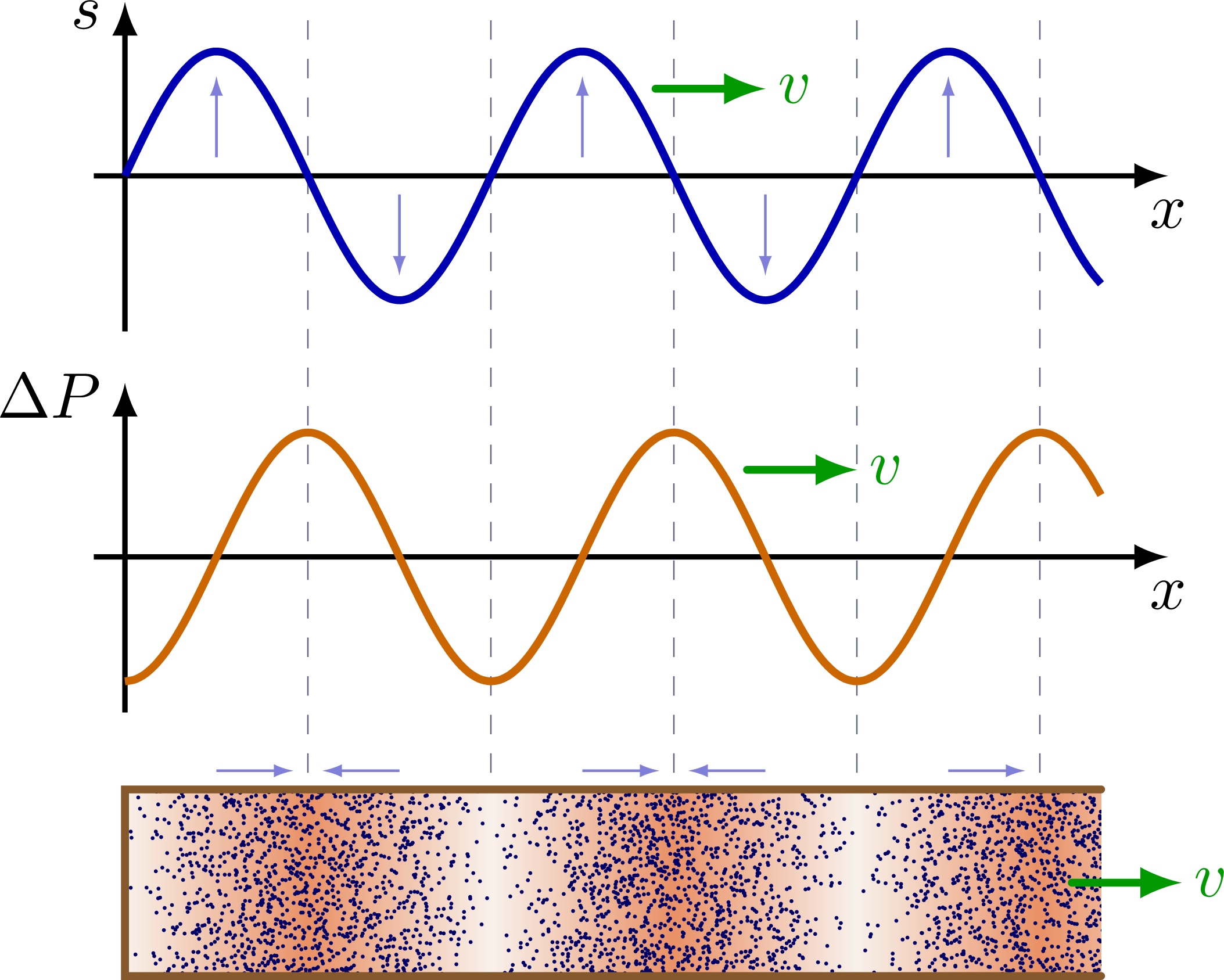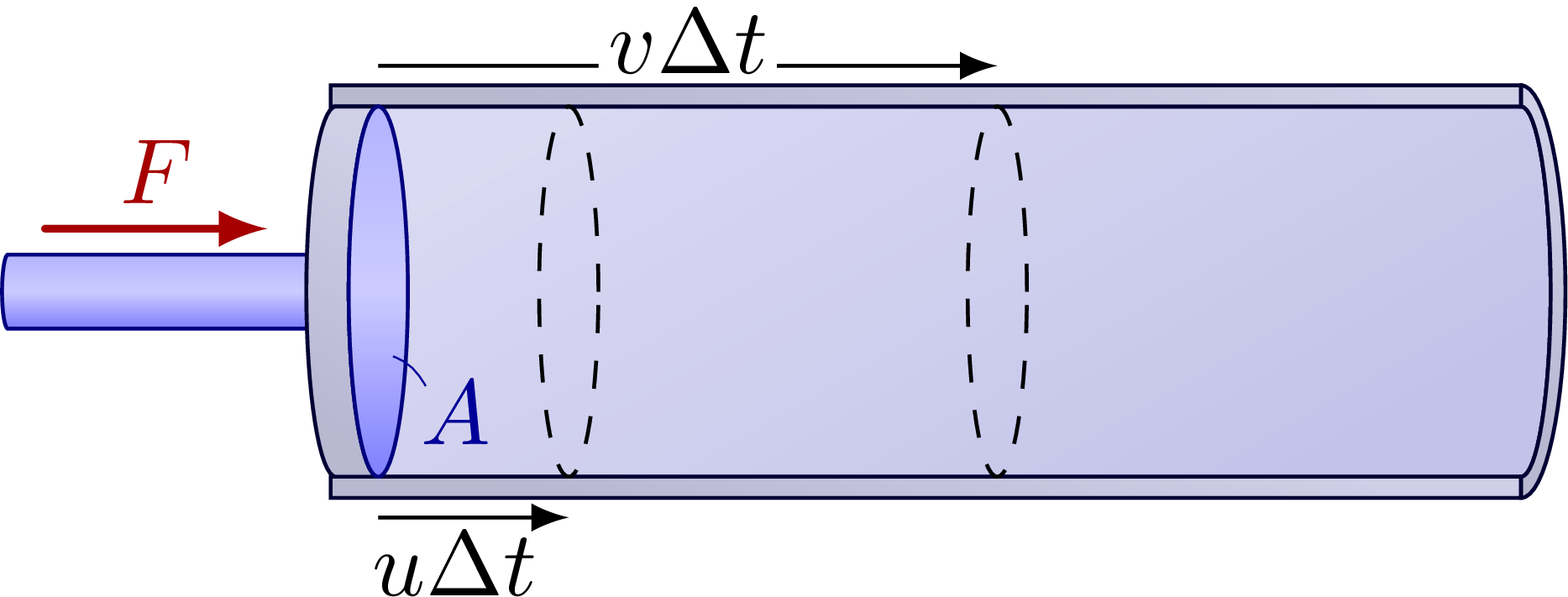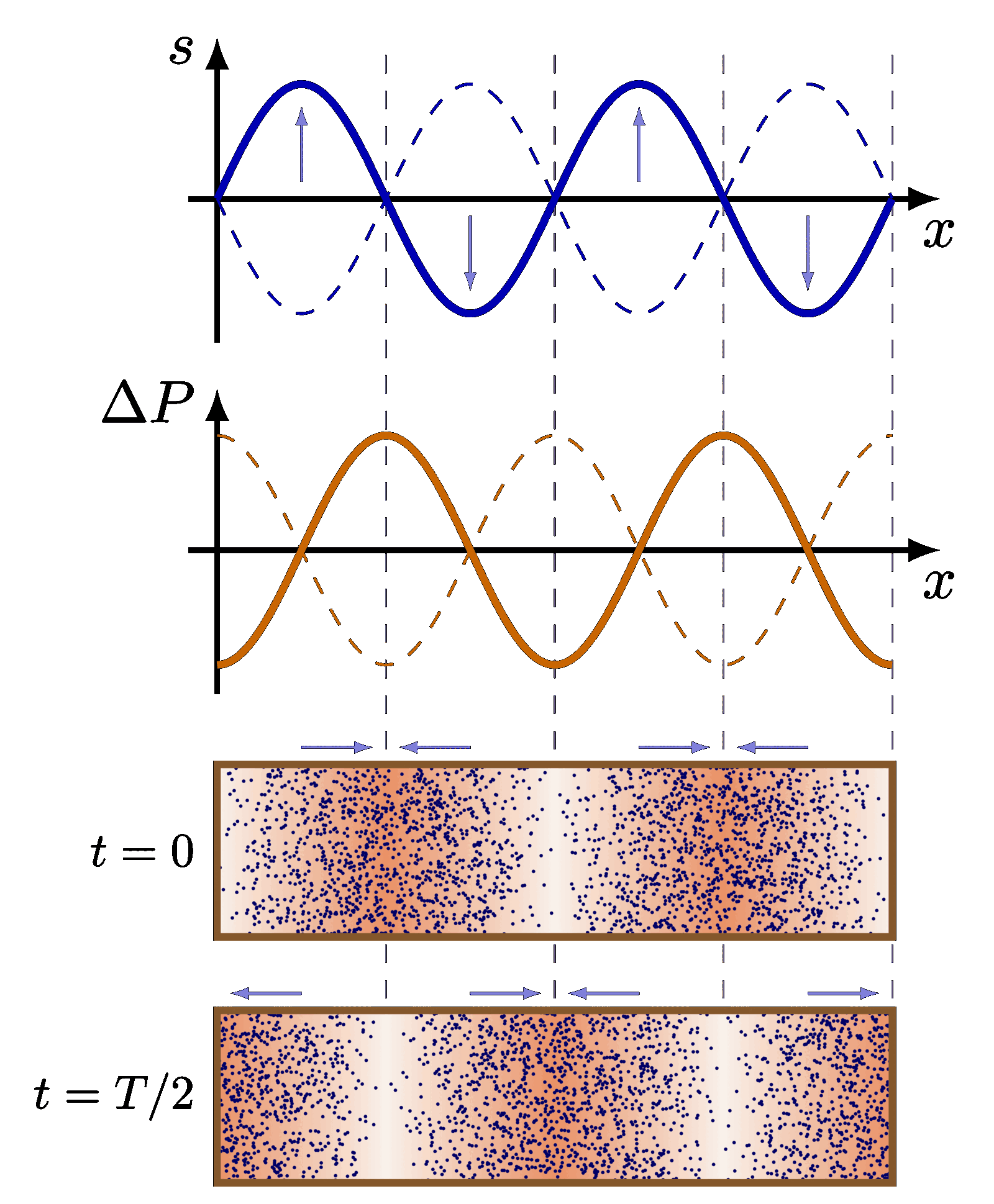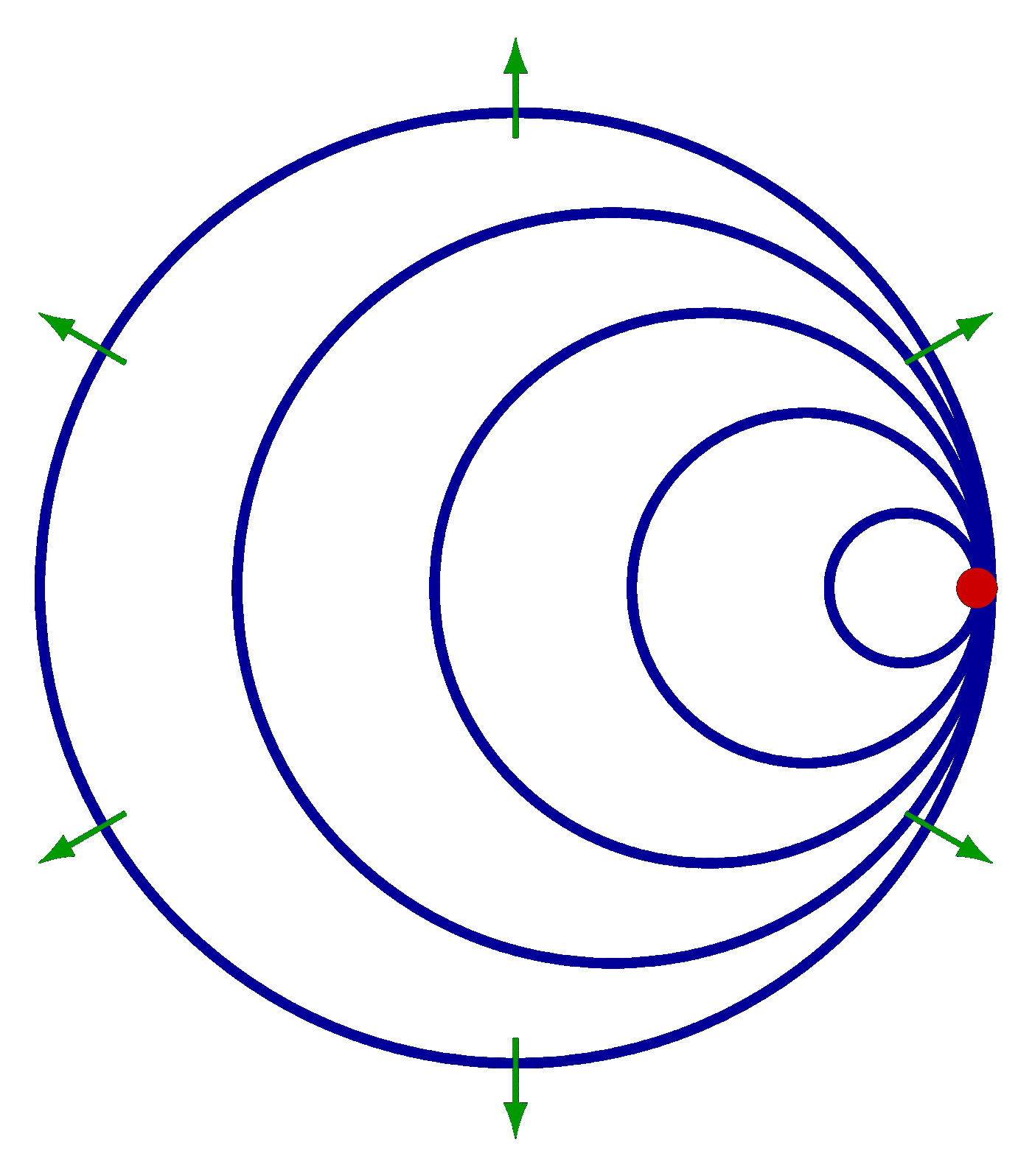% Author: Izaak Neutelings (December 2020)
% http://hyperphysics.phy-astr.gsu.edu/hbase/Waves/standw.html
\documentclass[border=3pt,tikz]{standalone}
\usepackage{amsmath}
\usepackage{etoolbox} % ifthen
\usepackage{tikz}
\usetikzlibrary{arrows.meta} % for arrow size
\tikzset{>=latex} % for LaTeX arrow head
\colorlet{myred}{red!65!black}
\colorlet{xcol}{blue!70!black}
\colorlet{vcol}{green!60!black}
\colorlet{Pcol}{orange!80!black}
\colorlet{dense air}{Pcol!70!red!60}
\colorlet{thin air}{brown!10}
\tikzstyle{vvec}=[->,vcol,very thick,line cap=round]
\tikzstyle{force}=[->,myred,thick,line cap=round]
\tikzstyle{wood}=[very thick,brown!70!black]
\tikzstyle{piston}=[blue!50!black,top color=blue!30,bottom color=blue!50,middle color=blue!20,shading angle=0]
\tikzstyle{walldark}=[blue!20!black,top color=black!10!white!90!blue,bottom color=black!20!white!90!blue,shading angle=-30]
\tikzstyle{wall}=[blue!20!black,top color=black!5!white!90!blue,bottom color=black!10!white!85!blue,shading angle=30]
\def\tick#1#2{\draw[thick] (#1) ++ (#2:0.1) --++ (#2-180:0.2)}
\tikzstyle{myarr}=[xcol!50,-{Latex[length=3,width=2]}]
\begin{document}
%% AIR PARTICLE DENSITY - test
%\begin{tikzpicture}
% \def\lam{2.0} % wavelength
% \def\N{1000}
% \fill[left color=white,right color=white,middle color=blue!80!black!30]
% (0,0) rectangle (\lam/2,1);
% \fill[left color=white,right color=white,middle color=blue!80!black!30]
% (\lam/2,0) rectangle (\lam,1);
% \draw (0,0) rectangle++ (\lam,1);
% \foreach \i in {1,...,\N}{
% \fill[blue!40!black] ({acos(-rand)*\lam/360},{(1+rand)/2}) circle(0.008);
% \fill[blue!40!black] ({\lam/2+acos(-rand)*\lam/360},{(1+rand)/2}) circle(0.008);
% }
%\end{tikzpicture}
%% AIR PARTICLE DENSITY - visual approximation - test
%\begin{tikzpicture}
% \def\lam{2.0} % wavelength
% \def\N{500}
% \fill[left color=white,right color=white,middle color=blue!80!black!30]
% (0,0) rectangle (\lam/2,1);
% \fill[left color=white,right color=white,middle color=blue!80!black!30]
% (\lam/2,0) rectangle (\lam,1);
% \draw (0,0) rectangle++ (\lam,1);
% \foreach \i in {1,...,\N}{
% \fill[blue!40!black] ({\lam/2*sqrt((rand+1)/8)},{(1+rand)/2}) circle(0.008);
% \fill[blue!40!black] ({\lam/2-\lam/4*sqrt((1-rand)/2)},{(1+rand)/2}) circle(0.008);
% \fill[blue!40!black] ({\lam/2+\lam/2*sqrt((rand+1)/8)},{(1+rand)/2}) circle(0.008);
% \fill[blue!40!black] ({\lam-\lam/4*sqrt((1-rand)/2)},{(1+rand)/2}) circle(0.008);
% }
%\end{tikzpicture}
% TRAVELLING WAVE
\begin{tikzpicture}
\def\ymax{0.85} % y maximum
\def\xmax{5.5} % x maximum
\def\A{0.80*\ymax} % amplitude
\def\D{1.20*\ymax} % pipe diameter
\def\lam{2.0} % wavelength
\def\L{0.97*\xmax} % length
\def\s{2.45*\ymax} % shift
\def\nwaves{3} % number of waves
\def\N{1200} % number of points
%\def\N{100} % number of points
% DISPLACEMENT
\foreach \i [evaluate={\x=(\i-0.5)*2*\lam/4;}] in {1,...,5}{
\ifodd\i \def\sgn{1} \else \def\sgn{-1} \fi % y position
\draw[myarr] (\x,\sgn*0.15*\A) --++ (0,\sgn*0.65*\A);
\draw[blue!20!black!60,very thin,dashed] (\x+\lam/4,\ymax) --++ (0,-2.1*\s);
}
\draw[->,thick] (0,-\ymax) -- (0,0.1+\ymax) node[below=2,left] {$s$};
\draw[->,thick] (-0.2*\ymax,0) -- (0.2+\xmax,0) node[below] {$x$};
\draw[xcol,very thick,samples=100,smooth,variable=\x,domain=0:\L]
plot(\x,{\A*sin(360/\lam*\x)});
%\draw[xcol,dashed,samples=100,smooth,variable=\x,domain=0:\L]
% plot(\x,{-\A*sin(360/\lam*\x)});
\draw[vvec] (1.45*\lam,0.70*\A) --++ (0.3*\lam,0) node[right=-2] {$v$};
% PRESSURE
\begin{scope}[shift={(0,-\s)}]
\draw[->,thick] (0,-\ymax) -- (0,0.1+\ymax) node[below=2,left] {$\Delta P$};
\draw[->,thick] (-0.2*\ymax,0) -- (0.2+\xmax,0) node[below] {$x$};
\draw[Pcol,very thick,samples=100,smooth,variable=\x,domain=0:\L]
plot(\x,{\A*sin(360/\lam*\x-90)});
%\draw[Pcol,dashed,samples=100,smooth,variable=\x,domain=0:\L]
% plot(\x,{-\A*sin(360/\lam*\x-90)});
\draw[vvec] (1.70*\lam,0.70*\A) --++ (0.3*\lam,0) node[right=-2] {$v$};
\end{scope}
% TUBE
\begin{scope}[shift={(0,-2.1*\s)}]
\fill[thin air] (0,0) rectangle++ (\L,\D);
\foreach \i [evaluate={\x=(\i-1)*\lam;\cond=\x+0.75*\lam<\L ? 1 : 0;}] in {1,...,\nwaves}{
\message{^^JWave \i}
\draw[myarr] (\x+0.25*\lam,1.1*\D) --++ ( 0.21*\lam,0);
\ifnum\cond=1
\draw[myarr] (\x+0.75*\lam,1.1*\D) --++ (-0.21*\lam,0);
\fi
\begin{scope}
\clip (0,0) rectangle (\L,\D);
\path[left color=thin air,right color=thin air,middle color=dense air]
(\x,0) rectangle (\x+\lam,\D);
\foreach \i in {1,...,\N}{
\fill[blue!40!black] ({\x+acos(-rand)*\lam/180},{\D*(1+rand)/2}) circle(0.01);
}
\end{scope}
}
\draw[wood,line cap=round] (\L,\D) -| (0,0) -- (\L,0);
\draw[vvec] (0.97*\L,0.50*\D) --++ (0.3*\lam,0) node[right=-2] {$v$};
\end{scope}
\end{tikzpicture}
% PISTON
\begin{tikzpicture}
\def\Ry{0.7}
\def\Rx{0.16*\Ry}
\def\ry{0.14}
\def\rx{0.16*\ry}
\def\w{0.08} % wall thickness
\def\x{0.18} % piston position
\def\L{4.5} % container length
\def\l{1.4} % piston length
\def\v{0.7} % piston length
\def\xu{0.16*\L} % distance with u
\def\xv{0.52*\L} % distance with v
% WIDTH
\draw[->] (\x,-1.22*\Ry) --++ (\xu,0) node[pos=0.4,below=-2] {$u\Delta t$};
\draw[->] (\x, 1.22*\Ry) --++ (\xv,0) node[midway,above=-2,fill=white,inner sep=1] {$v\Delta t$};
% WALL
\draw[wall]
(0,\Ry) arc (90:-90:{\Rx} and {\Ry}) --++ (\L,0) arc (-90:90:{\Rx} and {\Ry}) -- cycle;
%\draw[walldark] (0,0) ellipse ({\Rx} and \Ry);
% SHELL
%\draw[piston] % piston steele
% (\x-\l,\ry) arc (90:270:{\rx} and {\ry}) -|++ (\l,2*\ry) -- cycle;
%\draw[wall] (0,0) ellipse ({\Rx} and \Ry);
\draw[walldark] (0,\Ry) rectangle++ (\L,\w);
\draw[walldark] (0,-\Ry) rectangle++ (\L,-\w);
\draw[walldark]
(\L,\Ry+\w) arc (90:-90:{\Rx+0.7*\w} and {\Ry+\w}) --++ (0,\w) arc (-90:90:{\Rx} and {\Ry}) -- cycle;
% PISTON
\draw[piston] % piston steele
(\x-\l,\ry) arc (90:270:{\rx} and {\ry}) -|++ (\l,2*\ry) -- cycle;
\draw[walldark]
(\x,\Ry) arc (90:270:{\Rx} and {\Ry}) --++ (-2*\w,0) arc (-90:-270:{\Rx} and {\Ry}) -- cycle;
\draw[piston] (\x,0) ellipse ({\Rx} and \Ry);
%\draw[walldark] (\x+\l,0) ellipse ({\rx} and \ry);
% BOTTOM
%\draw[walldark]
% (0,\Ry) arc (90:270:{\Rx} and {\Ry}) --++ (0,-\w) arc (-90:-270:{\Rx+\w} and {\Ry+\w}) -- cycle;
% LABELS
\draw[dashed]
(\x+\xu,0) ellipse({\Rx} and {\Ry})
(\x+\xv,0) ellipse({\Rx} and {\Ry});
\draw[force] (\x-0.9*\l,1.7*\ry) --++ (0.6*\l,0)
node[midway,above=-1] {$F$};
%\draw[<-,thick,blue!60!black] (\x,0.7*\Ry) to[in=-30] (\x,1.2*\Ry)
% node[below=3,above left] {$A$};
\draw[very thin,blue!60!black] (\x+0.5*\Rx,-0.35*\Ry) to[out=-20,in=120]++ (1.1*\Rx,-0.16*\Ry)
node[below=0,below right=-4] {$A$};
\end{tikzpicture}
\end{document}
Click to download: waves_air.tex • waves_air.pdf
Open in Overleaf: waves_air.tex










